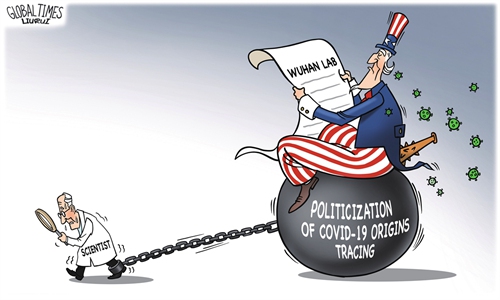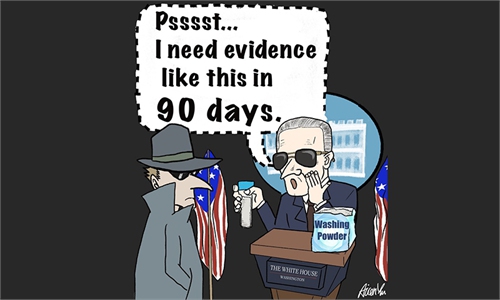
covid origins-tracing politicization Illustration: Liu Rui/Global Times
China has urged World Health Organization (WHO) officials to return to science and fairness and not to be subject to or willing to descend to become a tool of politicization of certain countries, after some in the international organization smeared China for lacking transparency in sharing data about COVID-19 origins. Using twisted and incomplete pieces of evidence to slander China on the origins of COVID-19 will only undermine the international body's credibility and impair investigations on the virus said experts.
An epidemiologist close to China's COVID-19 origins-tracing task group told the Global Times that next stage of origins-tracing should concentrate on animals who are more prone to carry coronaviruses, such as bats. China has done abundant work on investigating virus-carrying animals for years, and now the onus falls on other countries who could be linked to the virus to undertake similar investigations, to hopefully shed light on where the virus came from.
At a press conference on Saturday, Chinese scientists discussed their latest findings in the origins-tracing of COVID-19, which showed that virus strains found in samples from the Huanan Seafood Market are more likely to have come from humans. Additionally, experts stated that no COVID-19 antibodies were detected in the blood of donors in Wuhan prior to the outbreak in December 2019.
The release of these findings came amid a new round of accusations from some WHO officials, who claimed that China had failed to disclose data on COVID-19 origins-tracing. In response, Zhou Lei, a researcher from the Chinese Center for Disease Control and Prevention (China CDC) said at Saturday's news conference that as a Chinese scientist who took part in the China-WHO joint origins-tracing mission in 2021, she is surprised at these remarks.
During the joint origins-tracing mission, Chinese scientists shared all data and information, including information of more than 76,000 early cases of possible and suspected COVID infections in Wuhan, Zhou said.
"We conducted in-depth joint analysis and research, and the results were collectively approved by the WHO and Chinese experts at that time," she said.
Zhou noted that the WHO is a very important organization, an authoritative professional body recognized by the international community, and its scientific nature, rigor and impartiality are beyond doubt.
"I think if such a presumptuous accusation is made, it is the WHO's credibility that risks being damaged," she said.
WHO's accusation came after researchers at the China CDC published a new COVID-19 analysis on samples collected at Wuhan's Huanan Seafood Market in the science journal Nature on April 5. Prior to the analysis' official publication, the related data was shared on the Global Initiative in Sharing Avian Influenza Data (GISAID) database, but was allegedly deleted later, prompting widespread speculation.
In an interview with the Global Times on Friday, Liu Jun, a researcher from the China CDC who is also a member of the WHO-China joint expert team, clarified the facts, saying that Chinese researchers and the GISAID database never deleted the data in question, and the data access links used for journal review have always been in existence.
Offering details of the origins-tracing research, according to genetic sequencing of over 1,300 samples collected at Huanan Seafood Market from January to March 2020, all animal samples, about 400, tested negative for COVID-19, said Tong Yigang, dean of College of Life Science and Technology of Beijing University of Chemical Technology and group leader of the Chinese Animals and Environment team of the WHO-China Joint Mission on SARS-CoV-2 origin study, at the Saturday conference.
The three strains of virus isolated from more than 900 environmental samples collected from the market were almost identical to the patients' virus sequence at that time, suggesting that these strains of virus likely came from humans, Tong said.
China tested stored sera from healthy blood donors prior to the emergence of COVID-19 cases in Wuhan, having tested 43,850 blood samples donated by 30,000 people, Zhou noted. The results showed that no antibodies linked to COVID-19 were detected in these blood donors from Wuhan before December 2019.
These results echo the common finding in the phase I of WHO-China joint origins-tracing mission that no early cases were detected locally in Wuhan prior to December 2019, she said.
Next step
The next most urgent task to figure out where the virus originated is to investigate animals. If we find certain animals are the carrier of the coronavirus, we can use molecular biology to identify if it was the origin, Tong told the Global Times on Sunday. He noted that bats are the closest target for the task.
However, such animals have not yet been found, said Tong. He explained that China has done abundant research and investigation on animals that carry viruses in the past years, so we have a clear picture of the situation in China. "Comparatively, some countries, especially Southeast Asian countries close to us have done very little in this regard, thus I believe such work should be done in their countries," Tong said.
His opinion is echoed by other renowned world-level epidemiologists. Peter Daszak, head of the New York-based EcoHealth Alliance and member of the China-WHO joint coronavirus origin mission, who went to Wuhan in 2021, told the Global Times previously that the next location for their investigation is Southeast Asia.
"There was a virus from Thailand close to SARS-CoV-2, and also Japan and Cambodia. Ecohealth Alliance is already starting our work in tracing their origins," Daszak said.
Speaking at the Saturday press conference, Zhou said that "we really really want the origins-tracing to be global tracing," and that hopefully scientists can cover all possible countries and areas to find the origin of the virus, instead of hyping and focusing on Wuhan.
"We hope that the WHO, the authorized and global institution, can truly organize the international scientific community to conduct the work with a scientific, rigorous and fair attitude to help the world find the proper answer," Zhou said.



